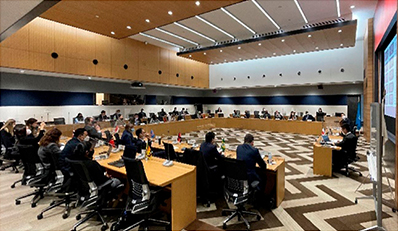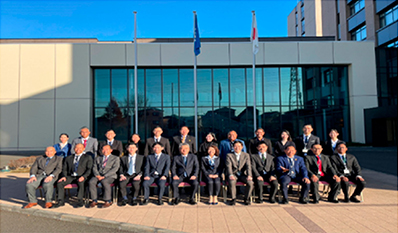(2) Assistance for Governance Including Anti-Corruption Measures
Corruption cases involving public officials, such as bribery and embezzlement, can become a factor that impedes the environment for fair competition and sound economic growth of developing countries. Therefore, it is necessary for donor countries to support good governance, including anti-corruption measures in developing countries to realize fair and stable societies.
● Japan’s Efforts

The 24th UNCAC Training Programme (Photo: UNAFEI)

Group photo at the 16th GG Seminar (Photo: UNAFEI)
As a State Party to the United Nations Convention against Corruption (UNCAC) and through its cooperation with the United Nations Office on Drugs and Crime (UNODC), the secretariat of the Convention, Japan is actively engaged in developing legal systems concerning the prevention of corruption and law enforcement operations, as well as in providing capacity building assistance to justice and law enforcement agencies.
In addition, through the United Nations Asia and Far East Institute for the Prevention of Crime and the Treatment of Offenders (UNAFEI), Note 37 Japan conducts annual training programs and seminars for criminal justice practitioners in developing countries, such as in Asia and Africa, as part of its legal technical assistance and support for governance, including anti-corruption measures.
As an example of a specific initiative, Japan annually holds an international training course on the criminal justice response to corruption since 1998. The training course is held with themes selected from the key issues of the UNCAC, and contributes to the sound development of the criminal justice system and the strengthening of cooperative relationships for preventing corruption in each country. In November 2022, the 24th UNCAC Training Programme on the theme of “Identifying, Tracing, Freezing, Seizing, Confiscating, and Recovering Proceeds of Corruption: Challenges and Solutions” was held face-to-face with participants visiting Japan.
Furthermore, Japan holds a seminar titled “Regional Seminar on Good Governance for Southeast Asian Countries (GG Seminar)” every fiscal year since 2007, with the objectives of supporting governance initiatives in Southeast Asian countries and contributing to human resources development in the area of criminal justice and anti-corruption. In December 2022, the 16th GG Seminar on the theme of “New and Emerging Forms of Corruption and Effective Countermeasures” was held face-to-face in Japan. It was attended by 17 criminal justice practitioners from 10 countries, namely 9 ASEAN member states (Brunei, Cambodia, Indonesia, Laos, Malaysia, the Philippines, Singapore, Thailand, and Viet Nam) and Timor-Leste.
UNAFEI’s activities are not limited to anti-corruption efforts, but also address important issues related to crime prevention and criminal justice in the international community. UNAFEI responds to the changing global society by holding training programs and seminars on these topics to criminal justice practitioners widely in developing countries around the world. For example, in 2022, various seminars and training were held online: the 177th International Senior Seminar on the theme of “Preventing Reoffending through a Multi-stakeholder Approach” was held from January to February, the 178th International Training Course on the theme of “Cybercrime and Digital Evidence” from June to July, and the 179th International Training Course on the theme of “Juvenile Justice and Beyond – Effective Measures for the Rehabilitation of Juveniles in Conflict with the Law and Young Adult Offenders” in September.
- Note 37: Established in 1962 based on an agreement between the UN and the Government of Japan. It is operated by the UN Training Cooperation Department of the Research and Training Institute within the Ministry of Justice. It has produced over 6,300 graduates from 142 countries and regions since its establishment.
